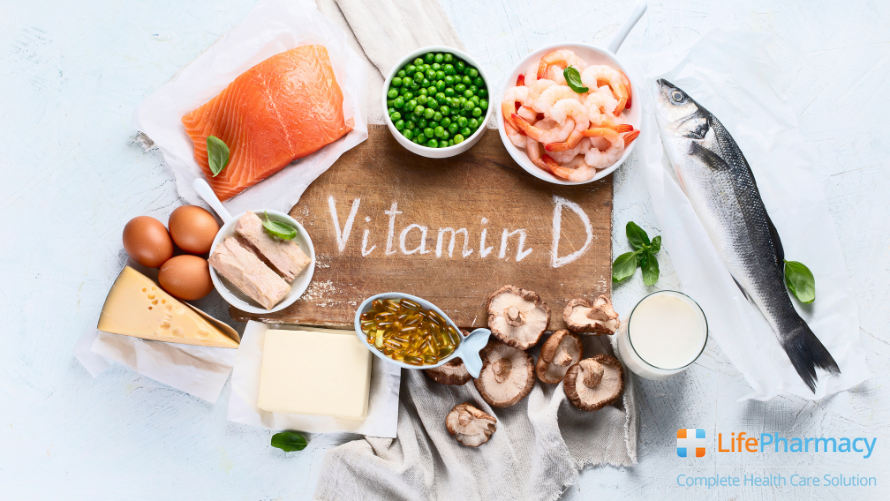Studies have shown that many individuals have a vitamin D deficiency, the causes for which may vary from person to person. Vitamin D supplements, if taken in the desired proportion, help to alleviate the shortage of this essential nutrient in the human body.
UK governments recommend that everyone take a vitamin D supplement containing 10 micrograms during winter as sunlight is scarce and our bodies may not produce enough of this essential vitamin naturally. How do I get my daily source of Vitamin D supplements? It is now easy to find top-quality vitamins and supplements online to support your health.
Understanding Vitamin D
Known as the 'sunshine vitamin,' vitamin D is produced when your skin is exposed to sunlight and can be found in foods like oily fish and egg yolks.
Vitamin D is a crucial fat-soluble vitamin that helps regulate calcium and phosphorus levels in the body. It is essential for building and maintaining healthy bones and teeth,by enabling your body to absorb calcium, the primary component of bone and teeth. Without enough vitamin D, bones can become thin, brittle, or misshapen.
This vitamin also plays a crucial role in regulating various cellular functions. Its anti-inflammatory, antioxidant, and neuroprotective properties support immune health,brain health and muscle function.
What Happens If You Don't Get Enough Vitamin D?
A deficiency in vitamin D can lead to several health problems, including:
-
Osteoporosis and other bone issues that result in weak bones and a high risk of fractures
-
Bone development issues that can cause deformities such as rickets in children
-
Weak muscles increase the risk of falls, especially in older adults
-
Poor immune system can make one susceptible to several diseases
Sources of Vitamin D
-
Sunlight: The Natural Source

The most natural way to get vitamin D is through sunlight. UV rays from sunlight trigger vitamin D production in the skin is an important aspect of maintaining good skin care. Factors like time of day, season, latitude, skin tone, and lifestyle affect how much vitamin D your body can produce. Brief exposure to the sun without sunscreen, for about 10 to 30 minutes, two to three times a week, is generally sufficient to synthesize Vitamin D.
However, experts advise that most sun exposure should be with sunscreen to protect against skin cancer. Besides protection against skin cancer, applying sunscreen has several other benefits. One should make applying sunscreen an essential part of their skincare routine to keep flaunting a healthy and radiant skin all year round. Artificial tanning to increase Vitamin D is strictly not recommended due to the high risk of skin cancer.
-
Dietary Sources of Vitamin D
Fatty fish such as salmon, tuna, mackerel, and sardines are rich in vitamin D. Fortified foods like milk, yogurt, orange juice, alternative milk products, and breakfast cereals also provide this vitamin. Other sources include beef liver, cheese, and egg yolks provide Vitamin D in small amounts. Mushrooms grown under ultraviolet lights may also provide this vitamin.
The Importance of Vitamin D Supplements
In colder climates, where sunlight is scarce, especially from October to May, our bodies struggle to produce sufficient vitamin D. This issue is further compounded for those who are vegetarian or vegan, as obtaining adequate vitamin D from food can be challenging.
Many people with dietary restrictions may need vitamin D supplements. Also, individuals with conditions that impair fat absorption, such as Crohn's disease, ulcerative colitis, celiac disease, or cystic fibrosis might have to opt for Vitamin D supplements. These supplements are available at the vitamins shop 24/7.
Vitamin D is vital for growing strong muscles and bones in children. Breastfed infants may require supplements since breast milk is not a good source of vitamin D. The recommended proportion is 400 IU per day for exclusively and partially breastfed infants until they consume enough vitamin D-fortified formula or whole milk.
As we age, our bodies produce less vitamin D when exposed to the sun, and lifestyle changes may limit sun exposure. Postmenopausal women are particularly encouraged to take vitamin D supplements to prevent osteoporosis. UK pharmacy will provide the best supplements to fulfill all your needs.
Additionally, certain groups face higher risks of vitamin D deficiency, including those who:
-
Use sunscreen regularly
-
Spend a lot of time indoors
-
Live in cities with buildings that block sunlight
-
People with darker skin
-
Reside in areas with high pollution
The recommended daily amount of vitamin D is 400 IU for children up to 12 months, 600 IU for ages 1 to 70, and 800 IU for those over 70.
Are you noticing any signs of vitamin D deficiency?
Life Pharmacy UK offers quality supplements to boost your health all year round.
Benefits of Vitamin D Supplements

If consumed in the right proportion, Vitamin D supplements can have the following benefits:
-
Fighting Viruses: Vitamin D can greatly help in boosting the immune system, thus helping in keeping flu and other viruses at bay.
-
Cancer: The evidence on vitamin D's role in cancer prevention is mixed, requiring further studies to confirm if vitamin D supplements can lower the risk of colon,breast and prostrate cancers.
-
Cognitive health: Research links low levels of vitamin D to cognitive decline, but additional studies are necessary to understand the benefits of vitamin D supplements for cognitive function.
-
Inherited bone disorders: Vitamin D supplements can help treat inherited conditions that impair the body's ability to absorb or process vitamin D, such as familial hypophosphatemia.
-
Multiple sclerosis: Studies indicate that long-term vitamin D supplementation may reduce the risk of multiple sclerosis.
-
Osteomalacia: Vitamin D supplements are effective in treating adults with severe vitamin D deficiency, which leads to reduced bone mineral content, bone pain, muscle weakness, and soft bones.
-
Osteoporosis: Adequate intake of vitamin D and calcium can slow bone mineral loss, help prevent osteoporosis, and reduce the risk of fractures. Consult your doctor about taking calcium and vitamin D supplements for osteoporosis prevention or treatment.
-
Psoriasis: Topical applications of vitamin D or preparations containing the vitamin D compound calcipotriene can effectively treat plaque-type psoriasis in some individuals.
-
Rickets: This rare condition in children results from vitamin D deficiency. Supplementing with vitamin D can prevent and treat rickets.
-
Depression: Although there is lack of evidence, Vitamin D supplements can elevate your mood that can help in overcoming depression. Similarly, there is hope that Vitamin D supplements might head off heart failure.
Experts at pharmacy online recommend consulting a doctor before starting supplements, as excess vitamin D can lead to health issues like:
-
Nausea and vomiting
-
Loss of appetite
-
Weight loss
-
Constipation
-
Weakness
-
Confusion and disorientation
-
Irregular heart rhythms
-
Kidney stones and damage
Recognizing and Addressing Vitamin D Deficiency
-
Symptoms of Vitamin D Deficiency
Symptoms include tiredness, aches and pains, severe bone pain, muscle weakness, a general feeling of being unwell, and stress fractures in the legs, pelvis, and hips.
-
Diagnosing Deficiency
If you suspect a vitamin D deficiency, consult your doctor. A simple blood test can measure your levels; in some cases, x-rays may be needed to assess bone strength. Your doctor may recommend high-strength vitamin D tablets or liquids based on the results.
-
Addressing Deficiency
To maintain optimal vitamin D levels, you might consider taking a vitamin D supplement as an "insurance dose." However, be cautious if you already take a multivitamin, as it is possible to overdose on vitamin D.
Some of our top recommended vitamin D products include:
-
Vitabiotics Ultra Vitamin D3 Tablets
-
Vitabiotics Ultra Vitamin D 1000IU Vegan Gummies
-
Vitabiotics Ultra Vitamin D 2000IU Extra Strength Tablet
Keep Vitamin D levels In Check With Life Pharmacy UK
Adequate vitamin D levels are crucial for maintaining overall health and preventing complications. Meeting your body's vitamin D needs is essential, whether through sunlight, diet, or supplements. If you have concerns about vitamin D levels, consult your doctor for advice and possible testing.
And remember, Life Pharmacy UK is available 24/7 to support all your medical needs. Whether you're looking for a Vitamin D supplement or other essential vitamins and supplements online, we've got you covered.






